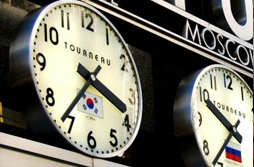 영어토론방 영어토론방 | Home>영어토론방 |
Policy Daylight saving time
페이지 정보

본문
 1.Government pushes daylight saving time
1.Government pushes daylight saving time A recent survey suggested the introduction of the daylight saving time would save the nation up to 136.2 billion won ($113.5 million) annually in energy, traffic and other costs.
The study conducted by seven state and private institutions said that 90 percent of workers surveyed do not worry that work time will be lengthened.
The government is considering adopting the "summertime" system as early as next April. A final decision will be made by October, officials said.
The survey was reported to President Lee Myung-bak and top policy makers during a Cabinet meeting Tuesday.
If clocks are moved forward between April and September, electricity consumption will be reduced by 0.13 to 0.25 percent, worth 34.1 billion to 65.3 billion won per year, the research said.
It would distribute traffic and reduce road accidents, saving 80.8 billion to 91.9 billon won.
The cost for adjusting computer systems was estimated at about 21 billion won.
In a poll of 1,001 adults, a majority responded that they expected to spend more time participating in outdoor activities, cultural life and self-development. In addition, the service industry will benefit from increased consumption, it said.
The study also projected that crimes will go down by 2.5 percent. More than 90 percent of respondents say they would feel safer at night.
During the meeting, Lee expressed support for DST, saying that it will help Koreans share more time with family.
"We should hear more pubic opinion before making a decision. A rough consensus in government favors its introduction," a presidential official said.
Business organizations have actively lobbied with the authorities for the time shift during summer time. Labor unions oppose DST out of concern that in Korea's corporate culture, it could be abused to prolong work hours without a pay raise.
Officials said Japan is also positively considering it. In a summit last month, Japanese Prime Minister Taro Aso responded positively to Lee's proposal for a joint introduction.
Korea has implemented it 12 times before, the last time in 1988 when Seoul hosted the summer Olympic Games.
By Hwang Jang-jin
2.Latest Findings Dismiss Benefits of Daylight Savings
By Jane Han
Staff Reporter
More than 85 countries _ mostly developed _ implement Daylight Saving Time (DST) for energy-saving benefits during the summer, but a state-run think tank report released Monday dismissed the possible gains the transition would bring here, which is expected to rekindle the debate over the possibility of local observance.
The report made by the Korea Development Institute (KDI), the Korea Energy Economic Institute, the Korean Transportation Institute and the Korea Culture and Tourism Institute, said the economic and energy benefits were hard to prove, refuting business and environmental groups claims so far.
DST, also known as ``summertime,'' is the convention of setting clocks ahead one hour in the spring and turning them back one hour in the fall, which transfers an hour of morning daylight to the evening. The most common benefits to result from DST are mainly in the interest of businesses _ as longer daylight allows lengthier money-spending activities _ and energy conservation with its artificial light cutback.
The Ministry of Commerce, Industry and Energy predicted earlier this year that the clock reset would help the country save 0.3 percent of total electricity and stir up leisure, travel and retail activities equivalent to about 860 billion won in spending, but the recent findings go against these estimations.
``The basis for the assumption was weak because empirical evidence has shown that there is little connection between daylight savings time and energy use,'' said a KDI researcher, as he added there was almost no change in electricity use in the 2000 Sydney Olympics when Australia observed the system.
He claimed that there have been no studies conducted abroad on the economic growth effect pushed by daylight savings.
Although there may be increases in recreation and leisure spending, he said no substantial change in daily working hours means little change in output.
At the other end of the argument are local business groups claiming the government can no longer delay the system's introduction to ensure sustainable development in a more eco-friendly and energy efficient manner.
The Federation of Korean Industries (FKI) and Korea Chamber of Commerce and Industry (KCCI) have participated in various symposiums and forums throughout the summer to promote the benefits of DST, but the decision was left up in the air due to a backlash from labor unions nationwide.
They claim that employers might abuse the system to force employees to work longer and called for a more thorough execution of the five-day workweek before any new system is introduced.
Each side of the argument maintains their position, as Korea may end up being virtually the last Organization of Economic Cooperation and Development (OECD) country not to adopt the DST. Japan and Iceland are the other two countries not using the system, but Japan has been actively reviewing joining the group, while Iceland doesn't see a reason to join due to its year-round long daylight.
Monday's study showed that a reduction in traffic accidents was the only solid benefit that could be found from DST, adding that if the country were to consider the system, it should cooperatively join with Japan in order to cut any extra expense that could result from rearranging international flights.
이 글은「대학연합영어토론동아리」www.pioneerclub.com에서 제공하는 영어토론 정보입니다.
댓글목록
등록된 댓글이 없습니다.

